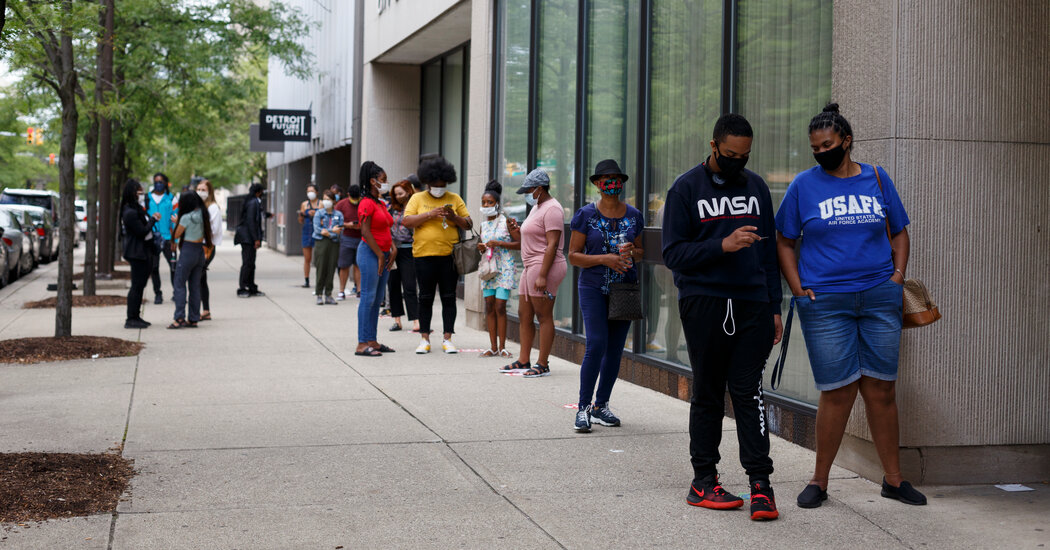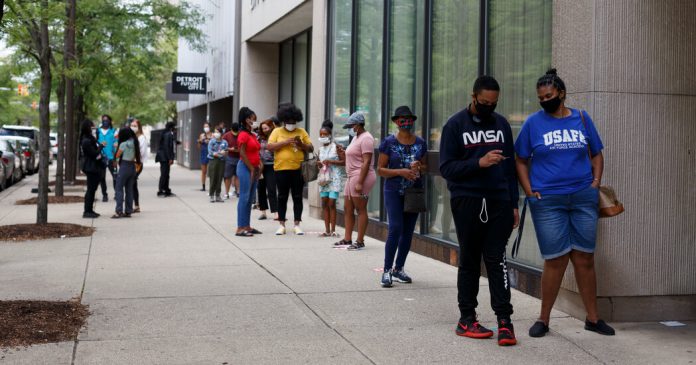
As the coronavirus continues to ravage large areas of the country, disrupting the nation’s political process, voters in several states including Michigan, Missouri and Kansas were rendering verdicts on fierce advocates for both parties’ bases on Tuesday, in some of the last remaining primaries before November’s general election.
It was another test of the mail-in voting systems that many states are relying on during the pandemic. The lack of immediate results was yet another precursor of what is likely to unfold in the general election, when the reliance on absentee voting systems could delay results past Election Day.
Among those drawing national attention Tuesday were a hard-line conservative seeking the Senate nomination in Kansas, an outspoken progressive in Michigan who has at times rankled her own party, and a left-wing challenger in Missouri seeking to make the case that Black establishment leaders are too centrist. In Missouri, voters were also deciding whether to expand Medicaid eligibility, a provision that state Republican leaders blocked years earlier.
States handled the election activity Tuesday with moderate success, as Americans continued to show a degree of comfort with mail-in and absentee voting systems even as President Trump and his allies have sought to sow distrust. In Michigan, where Representative Rashida Tlaib’s bid to win a second term in Congress was the most closely watched but where there was also an open House seat, more than 1.5 million voters had turned in an absentee ballot by late Tuesday afternoon, according to election officials, a sizable portion of the total electorate.
Voting rights activists in Michigan noted that, while there had not been any large-scale meltdowns as seen in previous primaries like Georgia’s, voters in the state were still struggling with somewhat common pandemic-related voting problems: delayed mail, missing absentee ballots, poll worker shortages and shuttered locations.
Most of the problems were in the Detroit area. Melanie McElroy, the election protection manager of Michigan Voices, a voting rights group, said that a poll worker shortage caused some sites in Detroit and Flint to open late, and others to be consolidated. In southwestern Michigan, which has a large Latino population, Ms. McElroy said that signs informing voters of new locations were not in Spanish.
Parts of states like Kansas and Missouri had fewer in-person polling locations than usual, but encouraged masks and social distancing for those who preferred to cast an in-person ballot. Nearly one million Arizona voters participated by mail, according to political groups, surpassing the mail-in record set in 2018.
The contests were a microcosm of several national political themes the parties are confronting, including the embrace of Republican candidates fashioned in the style of Mr. Trump, the progressive push to unseat more centrist House Democrats, and another trial run for the mail-in voting systems that have become a lifeline for states struggling to deal with the pandemic.
On the Republican side, the Kansas Senate race in particular offered another reminder that the party divisions that existed before Mr. Trump won will persist even after he leaves office. That includes the disagreement between deeply conservative activists, who are skeptical of Washington and approve of the type of white identity politics Mr. Trump has embraced, and the party’s traditional establishment — many members of which have argued that such messaging hurts the party long term.
In Missouri, Representative William Lacy Clay, a 10-term congressman, faced a rematch against Cori Bush, in a significant test of the power of the Democratic Party’s progressive wing.
The contests unfolded at a moment of extraordinary turmoil in the country, capping a summer defined by a pandemic and an economic crisis, as well as a national outcry over racism and police brutality. The primaries arrived at a precarious moment for Mr. Trump, who less than three months before Election Day faces widespread disapproval of his stewardship of the coronavirus outbreak and other challenges. And on both sides of the aisle, the races tested enthusiasm for voting amid a public health crisis.
In Detroit, Corlette Selman, 59, a hair stylist wearing a Black Lives Matter mask, said she felt as if she were voting for her life on Tuesday.
“What’s most important for me is to get the proper people in place to take over the Senate, to maintain the House and to get us a new president, because we can’t live like this anymore,” she said.
In Kansas, the Senate primary race was defined by heavy spending and sharply negative attacks between Republican candidates in a crowded field, as the contenders fought to prove their devotion to Mr. Trump. The winner of the primary is expected to face State Senator Barbara Bollier, a retired anesthesiologist who was until recently a Republican and did not have a significant primary battle of her own.
A statewide race for a Democrat in Kansas is always an uphill battle. But after the moderate Kansas City suburbs sent a Democrat to Congress in 2018, and as Mr. Trump faces a backlash even in red states, Republican strategists have grown increasingly uneasy about the contest over all — though many observers’ fears were especially concentrated on the prospect of a Kobach nomination.
Mr. Kobach, who has run for office multiple times, has long been a controversial figure in Kansas. He has cultivated a devoted conservative following but has also alienated more centrist Republicans.
Throughout the race, he sought to paint his lead primary rival, Representative Roger Marshall, as too moderate and insufficiently supportive of the president.
Mr. Marshall, who is in fact deeply conservative, especially on social issues, fought those characterizations at every turn while the Senate Republican leadership implored Mr. Trump to endorse Mr. Marshall and block Mr. Kobach. The president did not do so, fueling tensions between Capitol Hill and the White House.
Last week, Mr. Kobach, in effect, received some help from Senator Ted Cruz of Texas, who during an Air Force One flight with Mr. Trump sought to steer him away from a Marshall endorsement. He reminded the president that Mr. Marshall had supported former Gov. John Kasich of Ohio, now a vocal Trump critic, in the 2016 presidential primary.
Mr. Marshall was not the original top choice of party leaders, who had hoped that Secretary of State Mike Pompeo, a former Kansas congressman, would enter the race.
When Mr. Pompeo declined to run, top Senate Republicans rallied around Mr. Marshall, as did a range of influential organizations including the U.S. Chamber of Commerce and several anti-abortion groups. He also received the backing of the former Kansas senator Bob Dole, who remains a beloved figure in his home state.
Mr. Marshall made clear that one of his biggest concerns was the crowded field, with a list of rivals that also included Bob Hamilton, a businessman who started a successful plumbing company and has lent his campaign several million dollars. (His slogan: “Send in a plumber to drain the swamp.”)
That dynamic made the race fluid and unpredictable in its final days. Complicating matters further: An outside group, which appears to be linked to Democrats, has been advertising heavily and attacked Mr. Marshall in an apparent effort to elevate Mr. Kobach.
Nick Corasaniti and Kathleen Gray contributed reporting.
The post Primary Election Voters Start a Virus-Era Wait for Results appeared first on New York Times.







